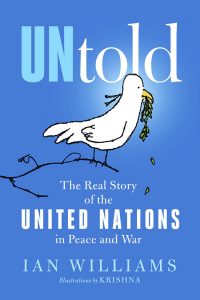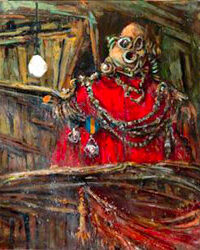Book Review: Lerone A. Martin’s The Gospel of J. Edgar Hoover: How the FBI Aided and Abetted the Rise of White Christian Nationalism
Back in 1961 FBI Director J. Edgar Hoover told staff it was their duty to “reaffirm” the bureau’s Christian purpose … to defend and perpetuate the dignity of the nation’s Christian endowment,” since Christianity was “the main line of resistance against all enemies of our heritage.” (P 229)
Many of us had assumed that this public devotion to Bible Belt Christianity was an expedient political front. However, Martin’s book put this in perspective. Hoover was truly a devout Presbyterian biblical fundamentalist, and even now the agency makes special recruitment efforts among true believers.
For many Americans the FBI is a creative mélange of motherhood and apple-pie lumpily squeezed into an ill-fitting suit, and yet despite concocting spurious conspiracies while turning a blinkered eye to real ones, the FBI has an unmerited public reputation for probity and efficiency. Unlike the FSB or the Stasis, the FBI, does not evoke instinctive shudders.
Yet this is the bureau that had Martin Luther King surrounded with a phalanx of agents, although they were indeed facing inwards rather than out! And then watched and applauded his assassination. They wiped out the Black Panthers, but only noticed QAnon and the Proud Boys after they had rampaged through Capitol Hill on January 6th on prime-time television.
It would be easy to dismiss this as the ambient racism of the social environment around the bureau osmosing in, but Lerone A. Martin shows differently. The FBI’s religiose and toxic white nationalism was built into its DNA by J. Edgar Hoover- a bigoted Presbyterian methodology survived scrutiny mostly because no one dared scrutinize it! And he was in fact a Sunday School teacher!
We have known for years that J Edgar Hoover was hardly a paragon of heterosexual virtue, but it would be churlish in these more accommodating days to question his life as a “confirmed bachelor” with his mother and then with Special Agent Clyde Tolson. His homophobic contemporaries managed to overlook it, even as the Bureau showed such a prurient and obsessive interest in the love lives of Black leaders, not least Bayard Rustin
But the one issue on which Ultramontane Catholics and fundamentalist Protestants converged was distaste for uppity Blacks, and in particular Martin Luther King. It is astounding how, in this era ,the overt racism and sexism of the FBI has essentially escaped excoriation and exposure. except of course the traits are coming back into fashion.
Hoover was also theologically innovative in other ways: at a time when for many white Protestants being Catholic was barely a step up from being Jewish or Black, he subcontracted the spiritual care of the FBI staff to the Jesuits and had them conduct regular retreats and training for his agents. He accepted the sword of Saint Ignatius Loyola as an honor, which has extra irony since Loyola took the Inquisition to India to whip burn and rack the recalcitrant Goanese into line to accept the church’s writ. The FBI’s investigative methods do emulate the Inquisition, but ecumenical before its time. the Bureau also hosted a Vespers service for its Protestants. But regardless of their views on the papacy or transubstantiation, the congregations had one thing in common: the homeopathic leavening of Black agents were not invited. Indeed, it were not so appalling it would be the subject of a comedy, Martin reports that for years the only Black special agents were Hoover’s driver and gardener – affirmative action appointments made at White House insistence.
His pioneering concordat between Roman Catholics and Protestants of the fundamentalist kind has presaged the politics of the last 60 years and that put a reactionary majority in control of the Supreme Court and many other institutions throughout the Republic. Hoover was ruling on minutiae like the religious orthodoxy of the Revised Standard Version. Even now the FBI has special programs for recruiting evangelists and has become clear over the last few years as the special blind eye towards white nationalist extremists is mirrored by a hypersensitivity to Black and Muslim activities.
Martin’s work is at once frustrating and profoundly incisive in its tight focus. Emerging from MLK’s own tradition of religious social and political activism, his concentration on the religious aspects of the struggle and divisions brings out whole dimensions rarely touched upon by secular students of the Civil Rights Struggle.
Not many of us browse through evangelical magazines, sermons and tracts, let alone or read the weekly sermons of Hoover to his staff. As historians, it’s our loss and we have to thank Lerone Martin for undertaking this task on our behalf and recentering this core ce of the civil rights struggle that we have overlooked. there are other books that could be written about the huge grand transgression of the constitution implied in integrating a Taliban-like cult into the core of law enforcement let alone the huge explicit racist agenda revealed by this correspondence. As a minister himself, Lerone Martin’s work is an essential contribution to the religious thinking motivating both sides of the civil rights struggle.
Ian Williams was born and brought up in Liverpool in the UK, where he was a member of the Labour Party Young Socialist in PM Harold Wilson’s Huyton constituency but veered leftwards, seduced by the Chinese Cultural Resolution. Expelled from Liverpool University for protesting its investments in Apartheid, he was on a delegation to China in 1970, when he had a drinking competition with Premier Chou En Lai and the Gang of Four, and arguing Eng Lit with Mme Mao.
Inoculated against Leninism, he joined the Labour Party in 1977 and remained a member until Starmer. Working on British Rail he had become a local union rep before being elected to the Executive of the National Union of Railwaymen (sic). In 1983 he had a Nuffield fellowship studying Indian unions, began writing professionally and since 1984 he has been a member of the British National Union of Journalists.
In 1987, he was a speech/article writer for UK Labour leader Neil Kinnock during the General Election. In 1989. Moving to New York, he has covered international politics from his coign of vantage at the UN, where he was the President of the UN Correspondents Association, setting up its annual awards. Currently President of the NY Foreign Press Association, he lectures on English Literature at BMCC/CUNY, and is the author of innumerable articles and nine published books, most recently on the UN and on George Orwell.




